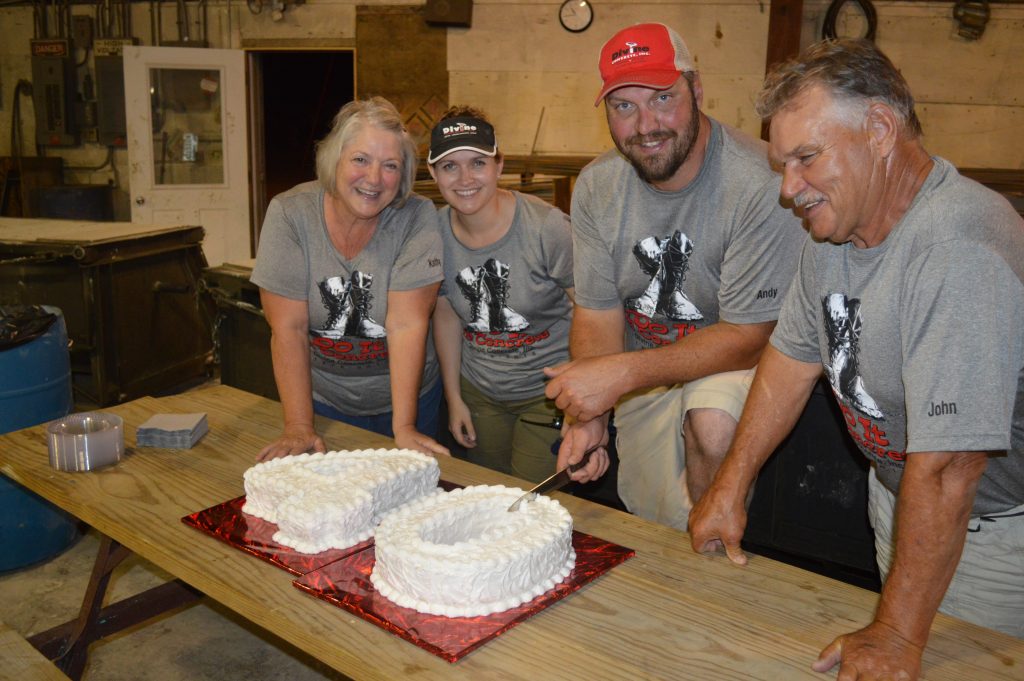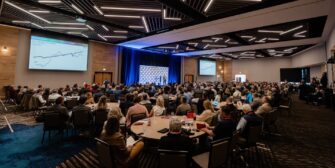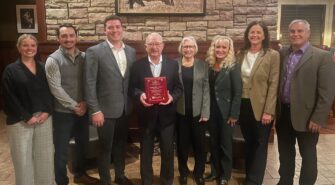3 Family Businesses Honored with Awards from Prairie Family Business Association
Recent News
Brother-sister business owners navigate second-generation leadership
Posted in Member News, Q&A | June 26, 2017
Brother-sister business owners navigate second-generation leadership
After starting more than 40 years ago in Bonesteel as a Redi-Mix plant, Divine Concrete Inc. has grown into a full-service concrete contractor in its second generation of family ownership.
Son Andy Divine took over for his parents, John and Kathy, and welcomed sister Sara Nolan as a business partner two years ago. We caught up with them to learn more about their growing business.
For people who aren’t familiar with Divine Concrete, what kind of services do you offer?
Andy: We are a one-stop shopping for your concrete construction. Very few concrete companies have the Redi-Mix plants, which make and deliver the concrete, and the construction crews and basically do any of the deliveries. So that’s different for a construction company to have all facets of concrete construction covered. Because of where we are geographically, we’re an extremely diverse construction company. We run our own crane instead of renting it. That’s the big difference with Divine Concrete. We are very self-sufficient. We’ve really had to become self-sufficient. Very rarely do we have to rely on another vendor or contractor to come in and help us. We literally can do everything from start to finish.
Sara: We have two experienced concrete construction crews that do a wide variety of construction projects. We have Redi-Mix concrete at three locations and an indoor precast manufacturing facility that makes an array of precast products with a high focus on quality fence-line feed bunks for the ag market.
As siblings, what successful strategies have you found in balancing your family relationship with your business one?
Sara: We never talk about work when we aren’t at work. We talk about work with other family members but not to each other. With our parents two blocks away, I think we do a good job of hanging out as “family” and leaving work at the office. I firmly believe if everything fell apart in the business due to a disagreement, our brother-sister relationship would still be positively intact.
Andy: I would say one thing that is beneficial, the biggest thing, is we both have kids that are about the same age. So we run into the same conflicts outside of work as far as scheduling with our spouse and who has day care. Otherwise, we’re completely different. My sister and I are two completely different people. She’s more analytical and likes everything controlled, and I really only function when the building is on fire. I don’t even get excited about work unless we’re behind and it’s raining and it’s snowing and we’re being sued. Sara wants it completely the other way, but since we both had kids and they have the same set of challenges it’s really gotten us more on the same page. That’s where our families have connected us more together on the business side. She’s barely 5’0, and I’m 6’2. You can’t get more different people. But you’ve got to have some common ground that gets everybody on the same page, and it is through our kids.

You are members of an affinity peer group through the Prairie Family Business Association. How has that helped you?
Andy: I’ve been in my peer group for seven years. We were one of the first groups to start, and our peer group really has helped me. We just had a meeting not that long ago and were talking about how when we first got together we were all buying our businesses from our parents. When I first decided to buy Divine it was just me, and Sara wasn’t planning on moving back. Everybody had the same challenges that I had as far as transitioning it from first generation to second generation. Now, our family and a lot of people in our peer group are farther down the road in their transition, so we’ve moved on to different challenges. Some of them have family members in the business, and we talk about that more than we do first to second generation. It’s now how to manage siblings and others in the business.
Sara: I have only gone to one official meeting, and it’s been great. For me, it gives me a place to network with like-minded individuals. Being nearly 100 miles away from a metro area, it can be a challenge to find peers to confide in.
You also will be attending the Prairie Family Business annual retreat in August. Why do you feel that will be valuable for you?
Sara: We have some important sticking points that come up time and time again, and having a neutral moderator to address them would be ideal. To me, PFBA does add value the same way larger corporation would have an outside board of directors. They are just more in tune with the unique personnel struggles that come with working side-by-side with our immediate family members.
Andy: I’ll be honest. I’m not sure yet. It’s hard for me to take two days and do something like that. People have said it works, it’s a good deal, go there and be open. But I think it’ll be good.
One thing I would say is it’s not that hard to run a business if all you want to do is make payroll and be somewhat successful. But if you want to have a really good businesspeople respect, that’s a lot more hard work, and being involved with the Prairie Family Business … and I’m the last person who goes to conferences … even me with that mentality has learned there is some serious value in talking and gaining information other people have.
What’s next for your business? Are you planning to further evolve it, and are you already thinking about your next generation?
Sara: Our kids are all under the age of 3, so frankly not really. Our small town is getting smaller — less than 275 people — so thinking about evolving the business can get tricky without thinking about your surrounding workforce limitations. If we could just streamline and become more efficient in our existing operation, that would be a dream.
Andy: One of the things we both agree with is the construction industry as a whole is a tough industry. Not just mentally but physically it takes a toll. When I started at 12 years old at the end of a shovel, even at a young age you could tell this is going to take a toll physically. If you do this like my dad did for 45 years, it’s obvious he didn’t drive a desk for a living. So you’ve got to look at that. Our kids would have to want to be in it. If my son came to me and wants to be a dentist, that’s fine. We do have a great culture here that I want them to be part of, even if they’re not in the business. When they come back, I expect them to treat the business and the family name respectfully. That’s our biggest thing whether they want to work here or not. I want them to be respectful and knowledgeable about how much effort the family has put into this business to make it successful. It just doesn’t run itself. It needs people driving it.



